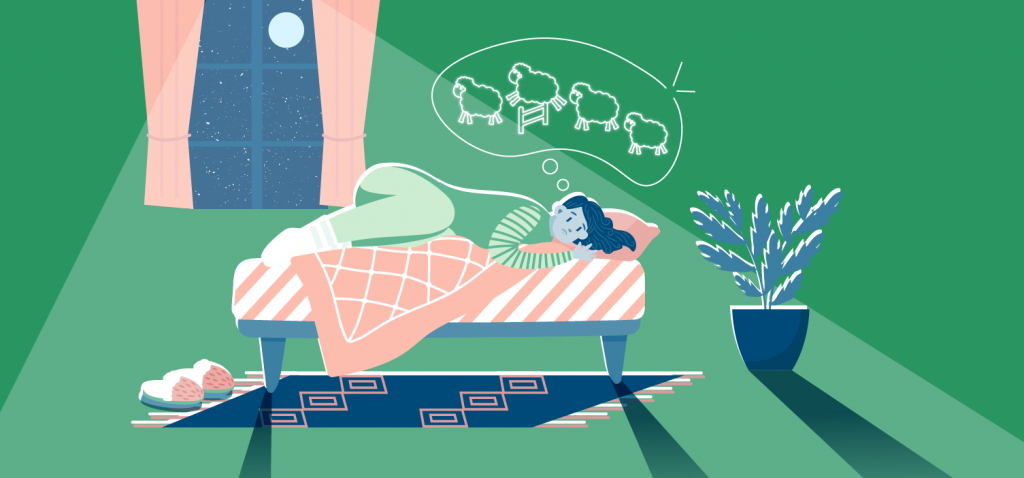Sleep can be a really frustrating necessity for those of us that struggle with it. It can feel like whether or not you sleep enough or too much is entirely out of your control. So when you find out that getting the right amount of sleep is linked to so many important benefits such as improving your heart health, immune system, memory, concentration levels and much more, it’d be understandable if you start to feel a little concerned.
Fortunately, sleep is something that has been extensively studied, and experts have come up with an array of solutions and methods to help you learn how to fall asleep and get the right amount of sleep to live a healthy and productive life.
Tired vs Sleepy
One thing that is asked a lot is “Why can’t I sleep even when I’m tired?” The simplest answer to this is that in order to fall asleep, we need to be sleepy, not tired. Although these two words have commonly been used interchangeably, they mean different things and signal different responses in our body.
Feeling tired means that you are fatigued, exhausted or that you just need rest. Whereas being sleepy specifically means that your body is showing signs that predict that you’re about to fall asleep. These signs include lack of energy, yawning, itchy eyes, aching muscles, and nodding off. If you haven’t experienced any of these signs but go to bed anyway, it’s more likely that you will be lying awake and aware.
Why Can’t You Sleep?
So while we’ve already established that you’re unlikely to fall asleep when you go to bed before you’re sleepy, there are a lot of other things that can prevent you from falling asleep. These can be split into physical, mental and habitual reasons. Some of these are:
Physical Reasons
- You’re too tired
- You’ve just finished exercising
- You’ve had caffeine recently
- You’re unwell
Mental Reasons
- Your mind is racing
- You’re worried or stressed
Habitual Reasons
- There is too much light pollution
- Your bed is uncomfortable
- There is too much noise
- You are on your phone or laptop just before trying to sleep
Why Do You Keep Waking Up?
It’s not just about falling asleep. A good night’s sleep includes staying asleep as well. Most people tend to wake up once or twice in a night. Everytime you wake up and every minute you stay awake has an effect on how you feel the next day. This is because quality of sleep is just as important as length of sleep.
Firstly, it’s important to point out that it’s normal to wake up during the night once in a while, and is generally fine and will be resolved on its own.
On the other hand, if you are having broken sleep every night or several times a week for an extended period of time, you may be suffering from Sleep Maintenance Insomnia.
In both of these cases, the causes of why you can’t sleep through the night are likely to be similar to those that prevent you from falling asleep quickly, as mentioned above. They could also include drinking alcohol not long before bed, or having a full bladder. Aside from this, it could be caused by other illnesses such as sleep apnoea, anxiety and depression.
Common Sleep Disorders
If you are having trouble getting to sleep, staying asleep, or staying awake during the day on a regular basis, you may be suffering from a sleep disorder. While there are many types, like most conditions, below is a list of common sleep disorders that many of us may suffer from at one time in our lives.
Insomnia is arguably the most well known sleep disorder. It is classified as the inability to fall asleep or sleep well. Insomnia can be caused by a variety of factors including poor sleep hygiene, stress, anxiety and depression.
Sleep Apnoea
Sleep apnoea is a sleep disorder whereby you temporarily stop breathing while you sleep. While this disorder is common and treatable, it can be difficult to find out you have it as you’re very rarely aware or remember occasions where you have stopped breathing and potentially woken up (many have only discovered the condition after it was spotted by a partner or close relative). However, you may feel unexplainably exhausted, irritable, or feeling low during the day. Sleep apnoea can be a life threatening condition, so it is important that you speak to your doctor if you think you may have it.
Narcolepsy
If you suffer from narcolepsy, you will experience excessive daytime sleepiness. You may also have sleep attacks, which involves falling asleep unexpectedly in the middle of common activities such as talking, walking and even driving. This makes the condition potentially dangerous and can therefore require treatment to help you manage the symptoms.
Restless Legs Syndrome (RLS)
Restless legs syndrome can be worsened by anxiety, but it is a separate condition, even though it is commonly misdiagnosed as this, or nervousness. RLS is an uncontrollable urge to move your legs (and sometimes arms). It is often presented by tingling or creeping sensations. It can prevent you from getting comfortable enough to sleep, or from having a quality night’s sleep.
There are tests online that you can take if you feel you may be suffering from a sleep disorder.
Self Help For Sleep Disorders
As there are many reasons why you may not be sleeping well at night, there are many ways to help change this. Finding out the cause is key to finding out what treatment(s) will work best for you. These are some useful things to consider when you’re lying awake in bed – either when you’re trying to sleep or when you wake up too early.
How do you feel emotionally?
Are you feeling anxious, upset or worried? If so, there may be a concern in your waking life that is preventing you from feeling relaxed enough to sleep. This could be anything, ranging from your relationships to your career.
On the other hand, you could be suffering from a mental health condition that is preventing you from being able to sleep. Identifying how you feel, and why you may feel that way, is an important step you can take towards getting a good night’s sleep.
How do you feel physically?
A common cause of having trouble sleeping is chronic pain and illnesses. If you are feeling nauseous or experiencing stomach pain, this could be due to something you’ve eaten in the day. Try keeping a food diary as you may have some intolerances.
If severe pain is waking you up in the middle of the night, it is best to speak to your doctor, or call NHS 111. Please note that you can call 999, if you think you may be experiencing a life threatening emergency.
What do you tend to do?
This will depend on what is keeping you awake, but in many cases, what you do when you’re struggling to sleep can have a negative impact. For example, many will lie awake in bed and look at their phone to pass the time. This could overstimulate your brain and prevent you from getting sleepy. Instead, try practicing relaxation techniques, such as focusing on your breathing, listening to a soothing podcast, audiobook, or white noise.
If you’re feeling anxious or restless, it may be a good idea to go for a little walk, or write down what may be worrying you so you can deal with it the next day.
What’s happening around you?
Is the sun already shining through your window? Does your partner snore or need the lamp on to sleep? If what is waking you up or stopping you from sleeping can be narrowed down to light or sound, it would be worthwhile to invest in earplugs or a sleep mask.
What did you do before you went to sleep?
After a day of work, many of us like to lie down and relax in front of the television, finally scroll through our phones or pick up that book we’ve been meaning to read. While there’s nothing wrong with any of these things, the timing of them is very important.
For at least an hour before you plan to go to sleep, turn off your TVs and laptops, and put down your mobile phone to prevent the blue light from stimulating your daytime hormones. Also try to avoid heavy meals and too many fluids late at night.
Plan a routine when you are getting ready for bed that lets your body know that it’s getting ready to sleep each time you start. This can simply be brushing your teeth, putting on your pyjamas and dimming the lights. Once you’re ready for sleep, ensure that you make your environment comfortable, and as cool, quiet and dark as you can.
What did your day look like?
Improving your general daytime habits is so important. What you do, eat and drink throughout the day can negatively or positively impact your sleep that night. Some of the best habits to adopt or change during the day are exercising regularly, reducing your intake of alcohol, caffeine and nicotine, carrying out relaxation techniques to manage your stress, and creating a standard sleeping schedule.
When Nothing’s Working
No matter what we suggest and what recommendations you find as a solution to your sleep problems when you read other articles, sometimes it’s just not enough. If this is happening to you, first assess if you’ve taken all reasonable steps to improve your sleep, and if you’ve given it enough time. Many of these techniques take more than a few days to truly impact your sleep pattern and quality of sleep.
If you do believe that you’ve done all you can, and even if you haven’t, there is help available. The first step would be seeing your doctor to find out what professional help you could get. These could be:
- Cognitive Behavioural Therapy (CBT): This is a form of therapy that will assess the mental and behavioral factors that are preventing you from sleeping. You will be provided with techniques that you will need to adopt to change your associations with sleep to help you fall asleep faster and stay asleep through the night. These will of course at first be conscious efforts but the aim is for them to become natural healthy habits over time.
- Medication: It is commonly discouraged that sleeping pills are taken in the first instance as though you can get them yourself as over the counter medication, or safely as a repeat prescription, they do have an addictive nature. It will therefore most likely be suggested that you try a number of different tactics first, depending on the severity of your condition. If however your sleep disorder is potentially dangerous, medication may be recommended much sooner.
- Referral to a sleep specialist or sleep clinic: The waiting lists for sleep clinics are notoriously long, but they can be worth it if your lack of sleep is severely impacting your life. You can ask your doctor for a referral, but they may choose to do so regardless based on an assessment of the symptoms of your possible sleep disorder.
If you choose to see a doctor about your sleeping problems, it is recommended that you keep a sleep diary for a week or so beforehand to help them diagnose your condition, and to help you find a treatment for your sleep disorder that is best for you.
Effects of Sleep Deprivation
Sleep deprivation, a result of consistent lack of sleep or low quality sleep, can have fairly significant effects on both your physical and mental health. The symptoms of sleep deprivation can range from weight gain to memory loss. Because of this, it’s important to be aware that you may not be able to tell how your trouble with sleep is affecting you; it could be having damaging effects even if you can’t tell.
Healthera
Healthera operates a leading healthcare marketplace that provides patients with medicines, healthcare services and products through the largest digital platform of pharmacies and GPs in the UK, including national chains and independent providers. Download Healthera App to order NHS repeat prescription online!


